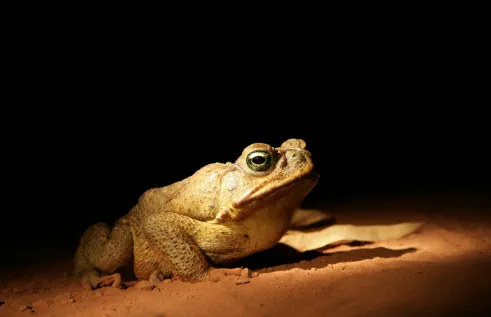News Article
CDU secures $2 million research boost
Charles Darwin University researchers have been awarded more than $2 million in funding following the latest round of Australian Research Council funding announcements.
Research projects investigating the resurgence of crocodiles in Australia, Indigenous languages, the microbiology of animal skin, monitoring marine megafauna and fire management for species conservation were awarded Discovery and Linkage grants.
The announcement includes funding for five projects led by teams across CDU’s Research Institute for the Environment and Livelihoods (RIEL) and the Northern Institute, and a further two where CDU researchers are collaborators on projects led by other universities.
The RIEL team of Professor Keith Christian, Professor Karen Gibb and Dr Mirjam Kaestli have secured a Discovery grant worth $450, 000 for their research project ‘Skin microbes and animal health: Understanding the ecological context’. This project aims to shed light on the ecological relationships between animal hosts and the bacteria in their skin, to provide insight into how they protect against disease.
Associate Professor Hamish Campbell and Dr Keller Kopf both from RIEL were awarded a Discovery grant of $390,000 to investigate ‘The ecological impact of large carnivore restoration’. The three-year project will aim to assess the ecological changes arising due to the repatriation of estuarine crocodiles to Australian ecosystems.
The RIEL team of Professor Sam Banks Dr Hugh Davies and Dr Brenton von Takach were awarded a $417, 000 Discovery grant titled ‘Can animal dispersal inform fire management for species conservation’, which aims to improve fire management for environmental outcomes in northern Australia.
RIEL Professor Sam Banks in collaboration with CSIRO’s Dr Rik Buckworth and Dr Carol Palmer from the Northern Territory Government was awarded a $535, 000 Linkage project to develop a ‘Collaborative science for monitoring of Northern Territory marine megafauna’. The team will employ cutting edge methods in genetics and movement ecology while uniting Indigenous rangers with marine national park managers and scientists.
The Northern Institutes team of Professor Steven Bird, Professor Michael Christie and Dr Michaela Spencer were awarded a Discovery grant of $366, 000 for their project to ‘Invest in Aboriginal languages’. This project will aim to develop the first systematic account of Aboriginal Language programs and understand what makes them effective and sustainable.
RIEL Co-Director Professor Karen Gibb has been named as Chief Investigator on the project ‘Do marine heatwaves cause pathogen outbreaks in Australian coastal waters?’ with the University Technology Sydney, while Northern Institute Director Professor Ruth Wallace is named a Chief Investigator on the project ‘Deadly Start: Enabling Preschoolers’ Literacy, Numeracy and Wellbeing’ led by the Australian Catholic University.
Related Articles

Nanoplastics hindering cognitive abilities of fish, international research shows
Nanoplastic exposure can impair the cognitive abilities of fish and could lead to significant impacts on marine species’ ability to survive, according to a new international study.
Read more about Nanoplastics hindering cognitive abilities of fish, international research shows
Eradication would cost billions: NT’s lessons for Pilbara’s cane toad management
Cane toads are predicted to invade Western Australia’s Pilbara region by 2041 if left unchecked, but the Northern Territory’s population of the pests hold key lessons that could save billions in eradication costs.
Read more about Eradication would cost billions: NT’s lessons for Pilbara’s cane toad management
New project to grow Indigenous aquaculture on one of Australia’s largest islands
An Australian island’s efforts to improve food security and transition into a blue economy will be bolstered by a new project to propagate a nutritious and increasingly popular fish.
Read more about New project to grow Indigenous aquaculture on one of Australia’s largest islands
